Reflective Essay: Incident Involving Infection Control in Acute Ward
VerifiedAdded on 2022/09/12
|9
|2065
|28
Essay
AI Summary
This reflective essay, based on the Gibbs reflection cycle, details a nursing student's critical incident involving a breach of infection control protocols during a placement in an acute ward. The student describes an instance where hand hygiene protocols were not followed after removing a patient's wound dressing, potentially compromising patient safety. The essay explores the student's feelings of perturbation, anger, and fear following the incident, along with an evaluation of the situation, including positive feedback from the mentor. The analysis section discusses the importance of hand hygiene, adherence to ethical principles like patient autonomy, and effective communication. The conclusion emphasizes the lessons learned regarding resilience, communication skills, and the importance of upholding ethical standards and patient safety. An action plan outlines intentions to improve assertive skills, embrace lifelong learning, adhere to infection control guidelines, and enhance communication skills to provide culturally safe care.
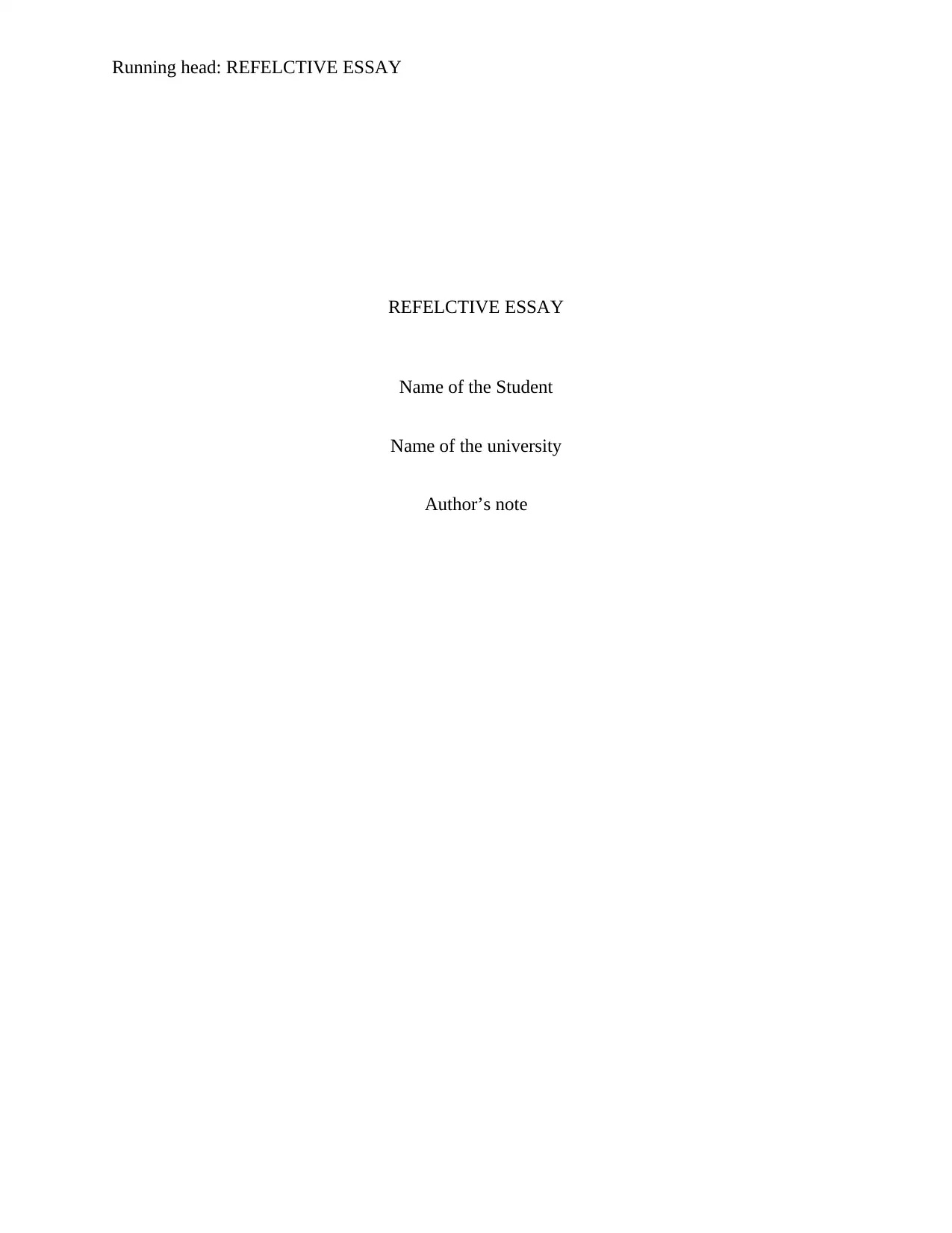
Running head: REFELCTIVE ESSAY
REFELCTIVE ESSAY
Name of the Student
Name of the university
Author’s note
REFELCTIVE ESSAY
Name of the Student
Name of the university
Author’s note
Paraphrase This Document
Need a fresh take? Get an instant paraphrase of this document with our AI Paraphraser
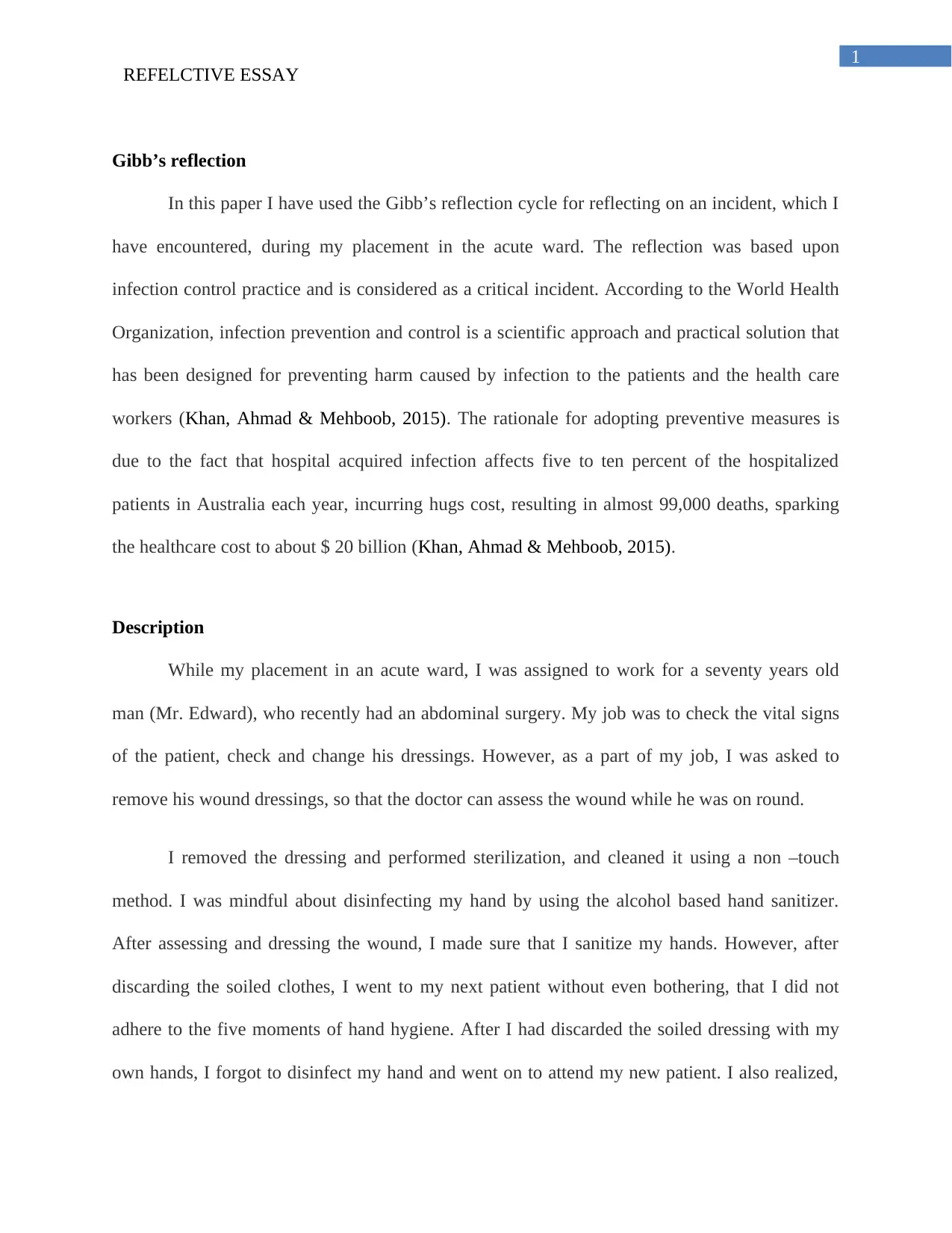
1
REFELCTIVE ESSAY
Gibb’s reflection
In this paper I have used the Gibb’s reflection cycle for reflecting on an incident, which I
have encountered, during my placement in the acute ward. The reflection was based upon
infection control practice and is considered as a critical incident. According to the World Health
Organization, infection prevention and control is a scientific approach and practical solution that
has been designed for preventing harm caused by infection to the patients and the health care
workers (Khan, Ahmad & Mehboob, 2015). The rationale for adopting preventive measures is
due to the fact that hospital acquired infection affects five to ten percent of the hospitalized
patients in Australia each year, incurring hugs cost, resulting in almost 99,000 deaths, sparking
the healthcare cost to about $ 20 billion (Khan, Ahmad & Mehboob, 2015).
Description
While my placement in an acute ward, I was assigned to work for a seventy years old
man (Mr. Edward), who recently had an abdominal surgery. My job was to check the vital signs
of the patient, check and change his dressings. However, as a part of my job, I was asked to
remove his wound dressings, so that the doctor can assess the wound while he was on round.
I removed the dressing and performed sterilization, and cleaned it using a non –touch
method. I was mindful about disinfecting my hand by using the alcohol based hand sanitizer.
After assessing and dressing the wound, I made sure that I sanitize my hands. However, after
discarding the soiled clothes, I went to my next patient without even bothering, that I did not
adhere to the five moments of hand hygiene. After I had discarded the soiled dressing with my
own hands, I forgot to disinfect my hand and went on to attend my new patient. I also realized,
REFELCTIVE ESSAY
Gibb’s reflection
In this paper I have used the Gibb’s reflection cycle for reflecting on an incident, which I
have encountered, during my placement in the acute ward. The reflection was based upon
infection control practice and is considered as a critical incident. According to the World Health
Organization, infection prevention and control is a scientific approach and practical solution that
has been designed for preventing harm caused by infection to the patients and the health care
workers (Khan, Ahmad & Mehboob, 2015). The rationale for adopting preventive measures is
due to the fact that hospital acquired infection affects five to ten percent of the hospitalized
patients in Australia each year, incurring hugs cost, resulting in almost 99,000 deaths, sparking
the healthcare cost to about $ 20 billion (Khan, Ahmad & Mehboob, 2015).
Description
While my placement in an acute ward, I was assigned to work for a seventy years old
man (Mr. Edward), who recently had an abdominal surgery. My job was to check the vital signs
of the patient, check and change his dressings. However, as a part of my job, I was asked to
remove his wound dressings, so that the doctor can assess the wound while he was on round.
I removed the dressing and performed sterilization, and cleaned it using a non –touch
method. I was mindful about disinfecting my hand by using the alcohol based hand sanitizer.
After assessing and dressing the wound, I made sure that I sanitize my hands. However, after
discarding the soiled clothes, I went to my next patient without even bothering, that I did not
adhere to the five moments of hand hygiene. After I had discarded the soiled dressing with my
own hands, I forgot to disinfect my hand and went on to attend my new patient. I also realized,
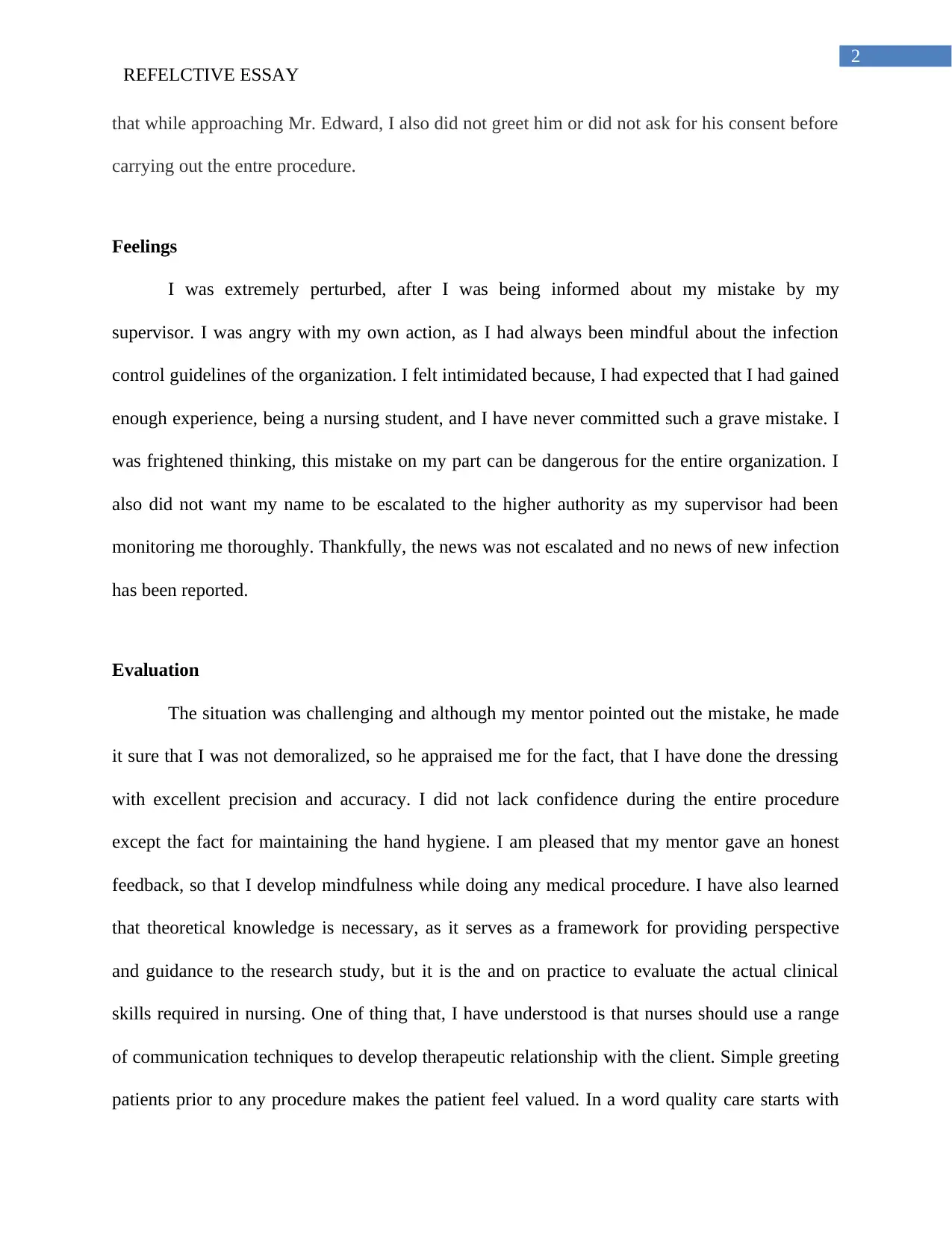
2
REFELCTIVE ESSAY
that while approaching Mr. Edward, I also did not greet him or did not ask for his consent before
carrying out the entre procedure.
Feelings
I was extremely perturbed, after I was being informed about my mistake by my
supervisor. I was angry with my own action, as I had always been mindful about the infection
control guidelines of the organization. I felt intimidated because, I had expected that I had gained
enough experience, being a nursing student, and I have never committed such a grave mistake. I
was frightened thinking, this mistake on my part can be dangerous for the entire organization. I
also did not want my name to be escalated to the higher authority as my supervisor had been
monitoring me thoroughly. Thankfully, the news was not escalated and no news of new infection
has been reported.
Evaluation
The situation was challenging and although my mentor pointed out the mistake, he made
it sure that I was not demoralized, so he appraised me for the fact, that I have done the dressing
with excellent precision and accuracy. I did not lack confidence during the entire procedure
except the fact for maintaining the hand hygiene. I am pleased that my mentor gave an honest
feedback, so that I develop mindfulness while doing any medical procedure. I have also learned
that theoretical knowledge is necessary, as it serves as a framework for providing perspective
and guidance to the research study, but it is the and on practice to evaluate the actual clinical
skills required in nursing. One of thing that, I have understood is that nurses should use a range
of communication techniques to develop therapeutic relationship with the client. Simple greeting
patients prior to any procedure makes the patient feel valued. In a word quality care starts with
REFELCTIVE ESSAY
that while approaching Mr. Edward, I also did not greet him or did not ask for his consent before
carrying out the entre procedure.
Feelings
I was extremely perturbed, after I was being informed about my mistake by my
supervisor. I was angry with my own action, as I had always been mindful about the infection
control guidelines of the organization. I felt intimidated because, I had expected that I had gained
enough experience, being a nursing student, and I have never committed such a grave mistake. I
was frightened thinking, this mistake on my part can be dangerous for the entire organization. I
also did not want my name to be escalated to the higher authority as my supervisor had been
monitoring me thoroughly. Thankfully, the news was not escalated and no news of new infection
has been reported.
Evaluation
The situation was challenging and although my mentor pointed out the mistake, he made
it sure that I was not demoralized, so he appraised me for the fact, that I have done the dressing
with excellent precision and accuracy. I did not lack confidence during the entire procedure
except the fact for maintaining the hand hygiene. I am pleased that my mentor gave an honest
feedback, so that I develop mindfulness while doing any medical procedure. I have also learned
that theoretical knowledge is necessary, as it serves as a framework for providing perspective
and guidance to the research study, but it is the and on practice to evaluate the actual clinical
skills required in nursing. One of thing that, I have understood is that nurses should use a range
of communication techniques to develop therapeutic relationship with the client. Simple greeting
patients prior to any procedure makes the patient feel valued. In a word quality care starts with
⊘ This is a preview!⊘
Do you want full access?
Subscribe today to unlock all pages.

Trusted by 1+ million students worldwide
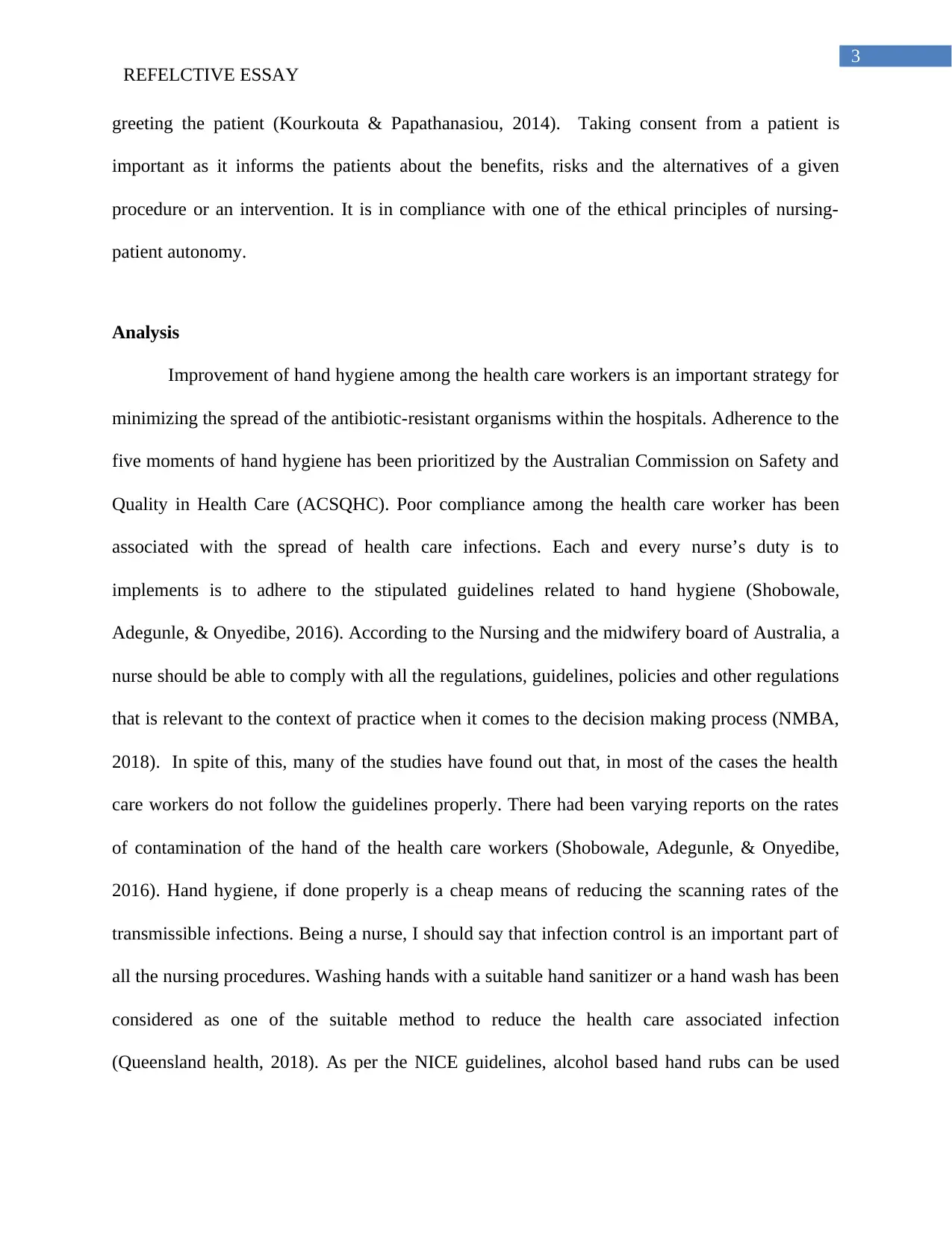
3
REFELCTIVE ESSAY
greeting the patient (Kourkouta & Papathanasiou, 2014). Taking consent from a patient is
important as it informs the patients about the benefits, risks and the alternatives of a given
procedure or an intervention. It is in compliance with one of the ethical principles of nursing-
patient autonomy.
Analysis
Improvement of hand hygiene among the health care workers is an important strategy for
minimizing the spread of the antibiotic-resistant organisms within the hospitals. Adherence to the
five moments of hand hygiene has been prioritized by the Australian Commission on Safety and
Quality in Health Care (ACSQHC). Poor compliance among the health care worker has been
associated with the spread of health care infections. Each and every nurse’s duty is to
implements is to adhere to the stipulated guidelines related to hand hygiene (Shobowale,
Adegunle, & Onyedibe, 2016). According to the Nursing and the midwifery board of Australia, a
nurse should be able to comply with all the regulations, guidelines, policies and other regulations
that is relevant to the context of practice when it comes to the decision making process (NMBA,
2018). In spite of this, many of the studies have found out that, in most of the cases the health
care workers do not follow the guidelines properly. There had been varying reports on the rates
of contamination of the hand of the health care workers (Shobowale, Adegunle, & Onyedibe,
2016). Hand hygiene, if done properly is a cheap means of reducing the scanning rates of the
transmissible infections. Being a nurse, I should say that infection control is an important part of
all the nursing procedures. Washing hands with a suitable hand sanitizer or a hand wash has been
considered as one of the suitable method to reduce the health care associated infection
(Queensland health, 2018). As per the NICE guidelines, alcohol based hand rubs can be used
REFELCTIVE ESSAY
greeting the patient (Kourkouta & Papathanasiou, 2014). Taking consent from a patient is
important as it informs the patients about the benefits, risks and the alternatives of a given
procedure or an intervention. It is in compliance with one of the ethical principles of nursing-
patient autonomy.
Analysis
Improvement of hand hygiene among the health care workers is an important strategy for
minimizing the spread of the antibiotic-resistant organisms within the hospitals. Adherence to the
five moments of hand hygiene has been prioritized by the Australian Commission on Safety and
Quality in Health Care (ACSQHC). Poor compliance among the health care worker has been
associated with the spread of health care infections. Each and every nurse’s duty is to
implements is to adhere to the stipulated guidelines related to hand hygiene (Shobowale,
Adegunle, & Onyedibe, 2016). According to the Nursing and the midwifery board of Australia, a
nurse should be able to comply with all the regulations, guidelines, policies and other regulations
that is relevant to the context of practice when it comes to the decision making process (NMBA,
2018). In spite of this, many of the studies have found out that, in most of the cases the health
care workers do not follow the guidelines properly. There had been varying reports on the rates
of contamination of the hand of the health care workers (Shobowale, Adegunle, & Onyedibe,
2016). Hand hygiene, if done properly is a cheap means of reducing the scanning rates of the
transmissible infections. Being a nurse, I should say that infection control is an important part of
all the nursing procedures. Washing hands with a suitable hand sanitizer or a hand wash has been
considered as one of the suitable method to reduce the health care associated infection
(Queensland health, 2018). As per the NICE guidelines, alcohol based hand rubs can be used
Paraphrase This Document
Need a fresh take? Get an instant paraphrase of this document with our AI Paraphraser
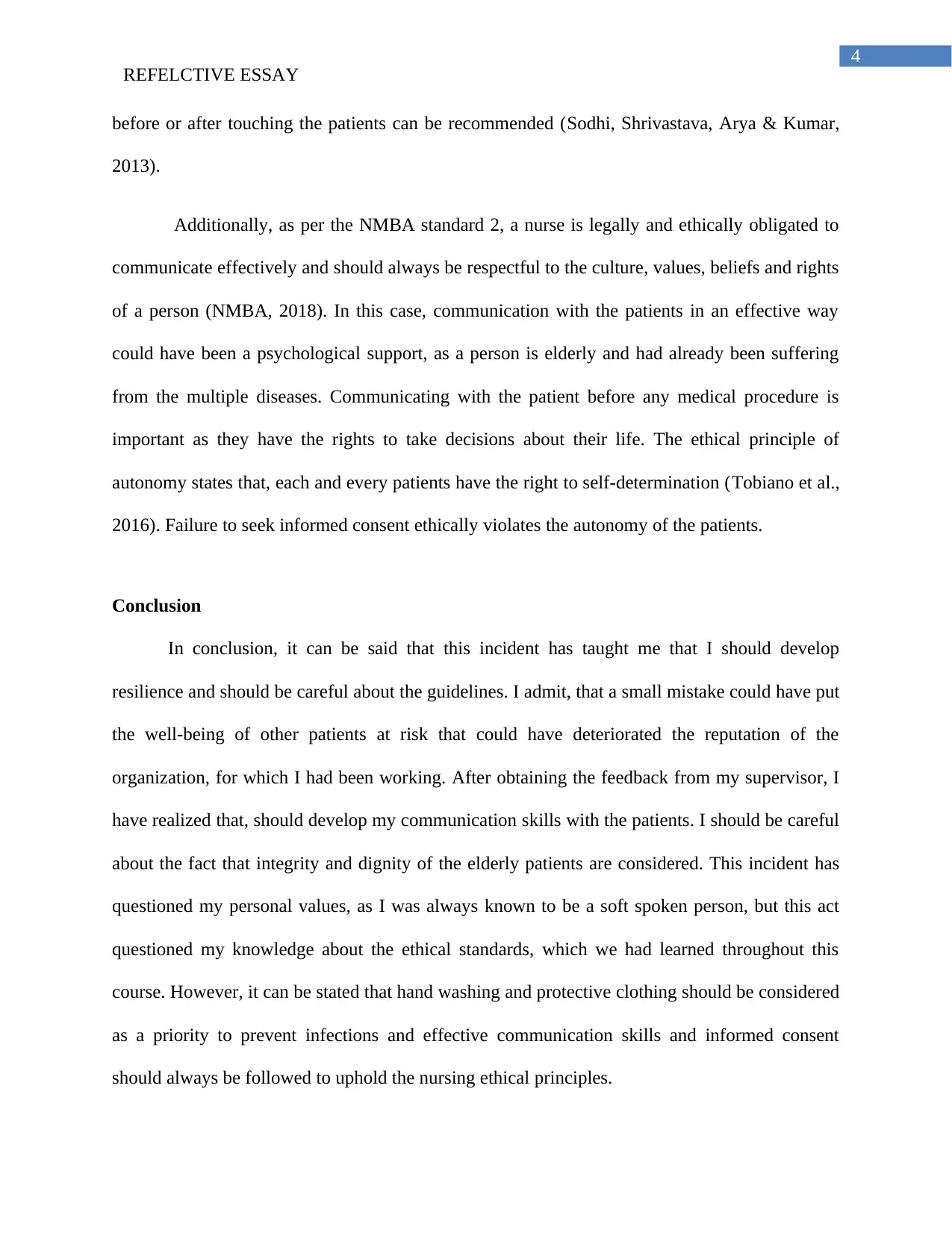
4
REFELCTIVE ESSAY
before or after touching the patients can be recommended (Sodhi, Shrivastava, Arya & Kumar,
2013).
Additionally, as per the NMBA standard 2, a nurse is legally and ethically obligated to
communicate effectively and should always be respectful to the culture, values, beliefs and rights
of a person (NMBA, 2018). In this case, communication with the patients in an effective way
could have been a psychological support, as a person is elderly and had already been suffering
from the multiple diseases. Communicating with the patient before any medical procedure is
important as they have the rights to take decisions about their life. The ethical principle of
autonomy states that, each and every patients have the right to self-determination (Tobiano et al.,
2016). Failure to seek informed consent ethically violates the autonomy of the patients.
Conclusion
In conclusion, it can be said that this incident has taught me that I should develop
resilience and should be careful about the guidelines. I admit, that a small mistake could have put
the well-being of other patients at risk that could have deteriorated the reputation of the
organization, for which I had been working. After obtaining the feedback from my supervisor, I
have realized that, should develop my communication skills with the patients. I should be careful
about the fact that integrity and dignity of the elderly patients are considered. This incident has
questioned my personal values, as I was always known to be a soft spoken person, but this act
questioned my knowledge about the ethical standards, which we had learned throughout this
course. However, it can be stated that hand washing and protective clothing should be considered
as a priority to prevent infections and effective communication skills and informed consent
should always be followed to uphold the nursing ethical principles.
REFELCTIVE ESSAY
before or after touching the patients can be recommended (Sodhi, Shrivastava, Arya & Kumar,
2013).
Additionally, as per the NMBA standard 2, a nurse is legally and ethically obligated to
communicate effectively and should always be respectful to the culture, values, beliefs and rights
of a person (NMBA, 2018). In this case, communication with the patients in an effective way
could have been a psychological support, as a person is elderly and had already been suffering
from the multiple diseases. Communicating with the patient before any medical procedure is
important as they have the rights to take decisions about their life. The ethical principle of
autonomy states that, each and every patients have the right to self-determination (Tobiano et al.,
2016). Failure to seek informed consent ethically violates the autonomy of the patients.
Conclusion
In conclusion, it can be said that this incident has taught me that I should develop
resilience and should be careful about the guidelines. I admit, that a small mistake could have put
the well-being of other patients at risk that could have deteriorated the reputation of the
organization, for which I had been working. After obtaining the feedback from my supervisor, I
have realized that, should develop my communication skills with the patients. I should be careful
about the fact that integrity and dignity of the elderly patients are considered. This incident has
questioned my personal values, as I was always known to be a soft spoken person, but this act
questioned my knowledge about the ethical standards, which we had learned throughout this
course. However, it can be stated that hand washing and protective clothing should be considered
as a priority to prevent infections and effective communication skills and informed consent
should always be followed to uphold the nursing ethical principles.
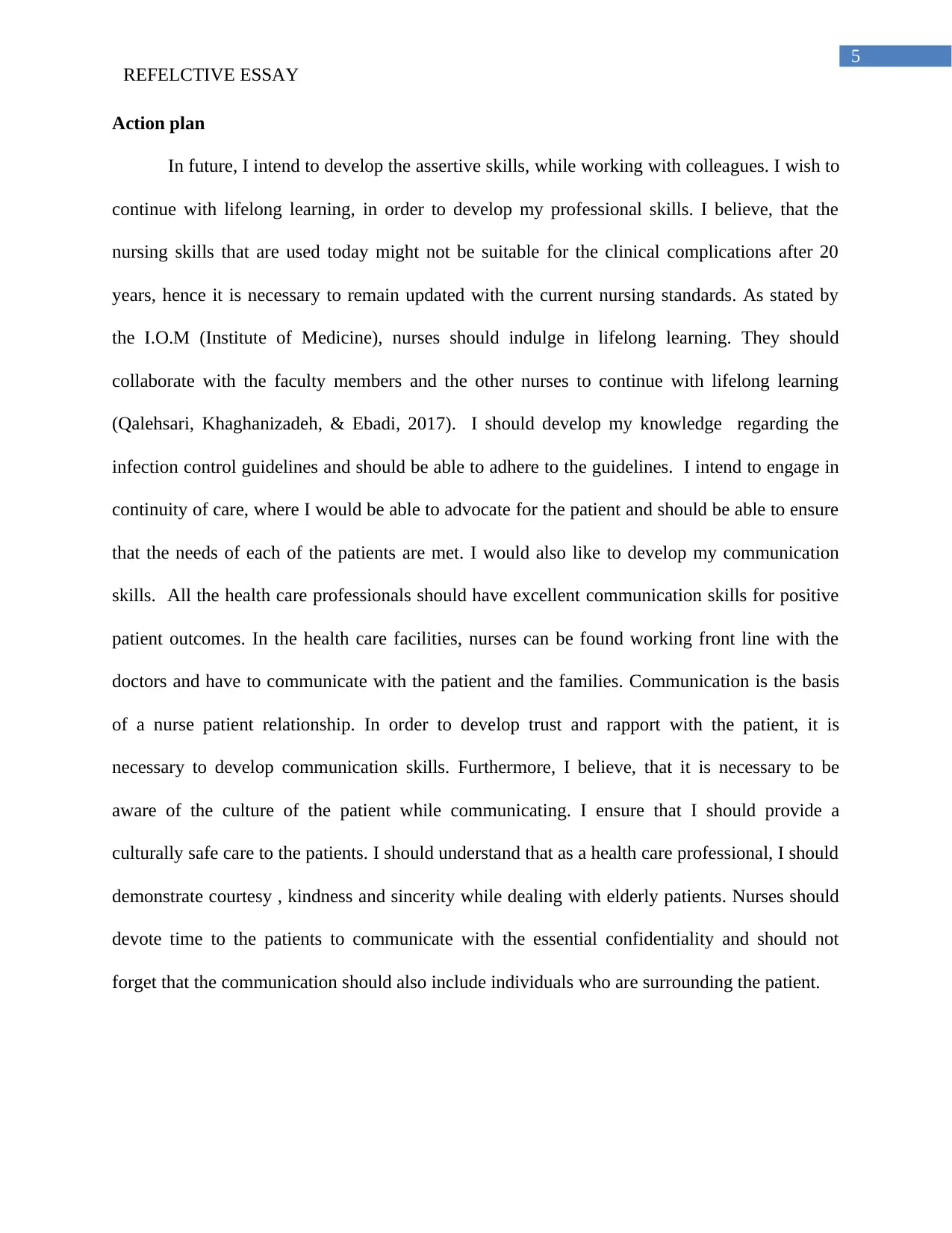
5
REFELCTIVE ESSAY
Action plan
In future, I intend to develop the assertive skills, while working with colleagues. I wish to
continue with lifelong learning, in order to develop my professional skills. I believe, that the
nursing skills that are used today might not be suitable for the clinical complications after 20
years, hence it is necessary to remain updated with the current nursing standards. As stated by
the I.O.M (Institute of Medicine), nurses should indulge in lifelong learning. They should
collaborate with the faculty members and the other nurses to continue with lifelong learning
(Qalehsari, Khaghanizadeh, & Ebadi, 2017). I should develop my knowledge regarding the
infection control guidelines and should be able to adhere to the guidelines. I intend to engage in
continuity of care, where I would be able to advocate for the patient and should be able to ensure
that the needs of each of the patients are met. I would also like to develop my communication
skills. All the health care professionals should have excellent communication skills for positive
patient outcomes. In the health care facilities, nurses can be found working front line with the
doctors and have to communicate with the patient and the families. Communication is the basis
of a nurse patient relationship. In order to develop trust and rapport with the patient, it is
necessary to develop communication skills. Furthermore, I believe, that it is necessary to be
aware of the culture of the patient while communicating. I ensure that I should provide a
culturally safe care to the patients. I should understand that as a health care professional, I should
demonstrate courtesy , kindness and sincerity while dealing with elderly patients. Nurses should
devote time to the patients to communicate with the essential confidentiality and should not
forget that the communication should also include individuals who are surrounding the patient.
REFELCTIVE ESSAY
Action plan
In future, I intend to develop the assertive skills, while working with colleagues. I wish to
continue with lifelong learning, in order to develop my professional skills. I believe, that the
nursing skills that are used today might not be suitable for the clinical complications after 20
years, hence it is necessary to remain updated with the current nursing standards. As stated by
the I.O.M (Institute of Medicine), nurses should indulge in lifelong learning. They should
collaborate with the faculty members and the other nurses to continue with lifelong learning
(Qalehsari, Khaghanizadeh, & Ebadi, 2017). I should develop my knowledge regarding the
infection control guidelines and should be able to adhere to the guidelines. I intend to engage in
continuity of care, where I would be able to advocate for the patient and should be able to ensure
that the needs of each of the patients are met. I would also like to develop my communication
skills. All the health care professionals should have excellent communication skills for positive
patient outcomes. In the health care facilities, nurses can be found working front line with the
doctors and have to communicate with the patient and the families. Communication is the basis
of a nurse patient relationship. In order to develop trust and rapport with the patient, it is
necessary to develop communication skills. Furthermore, I believe, that it is necessary to be
aware of the culture of the patient while communicating. I ensure that I should provide a
culturally safe care to the patients. I should understand that as a health care professional, I should
demonstrate courtesy , kindness and sincerity while dealing with elderly patients. Nurses should
devote time to the patients to communicate with the essential confidentiality and should not
forget that the communication should also include individuals who are surrounding the patient.
⊘ This is a preview!⊘
Do you want full access?
Subscribe today to unlock all pages.

Trusted by 1+ million students worldwide
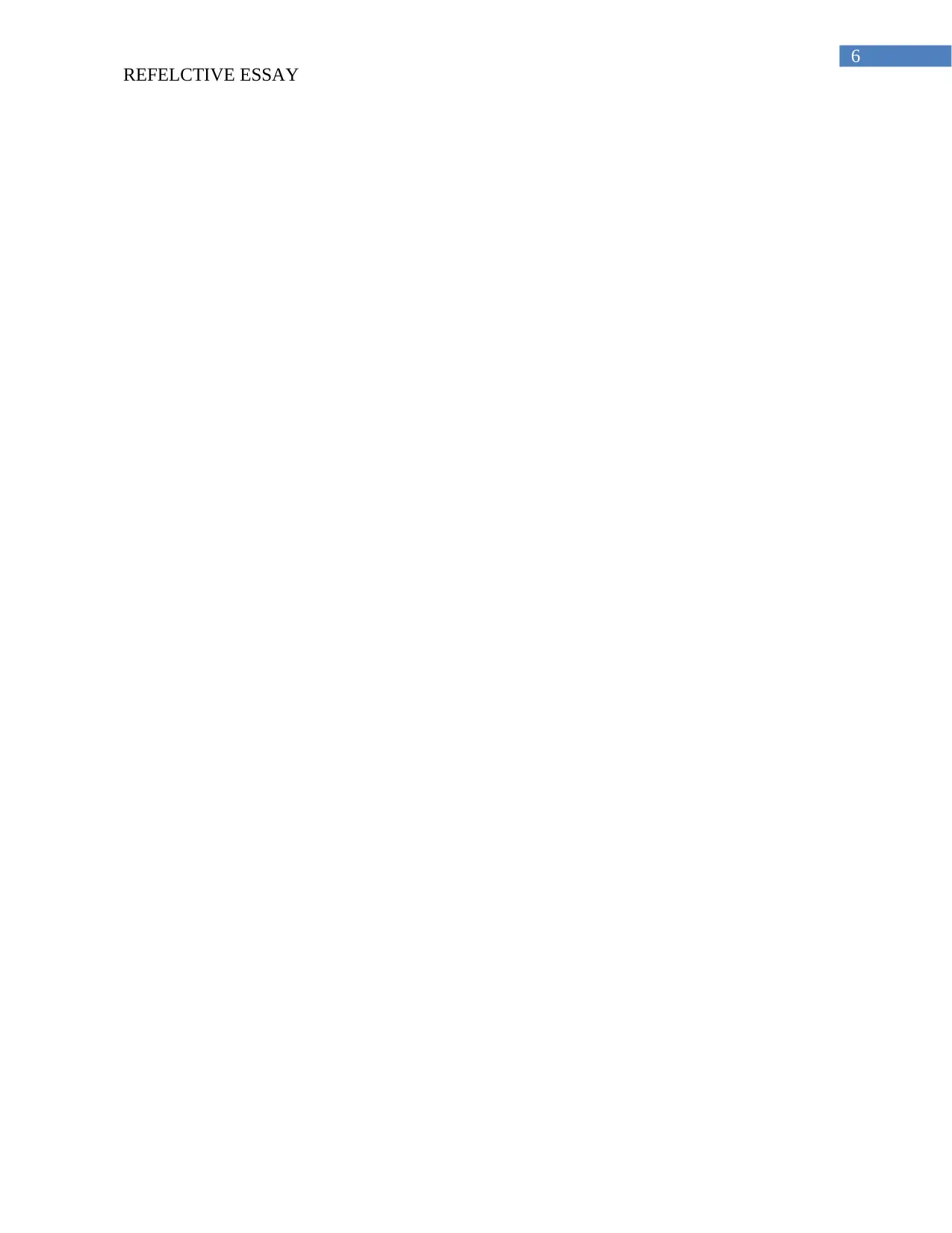
6
REFELCTIVE ESSAY
REFELCTIVE ESSAY
Paraphrase This Document
Need a fresh take? Get an instant paraphrase of this document with our AI Paraphraser
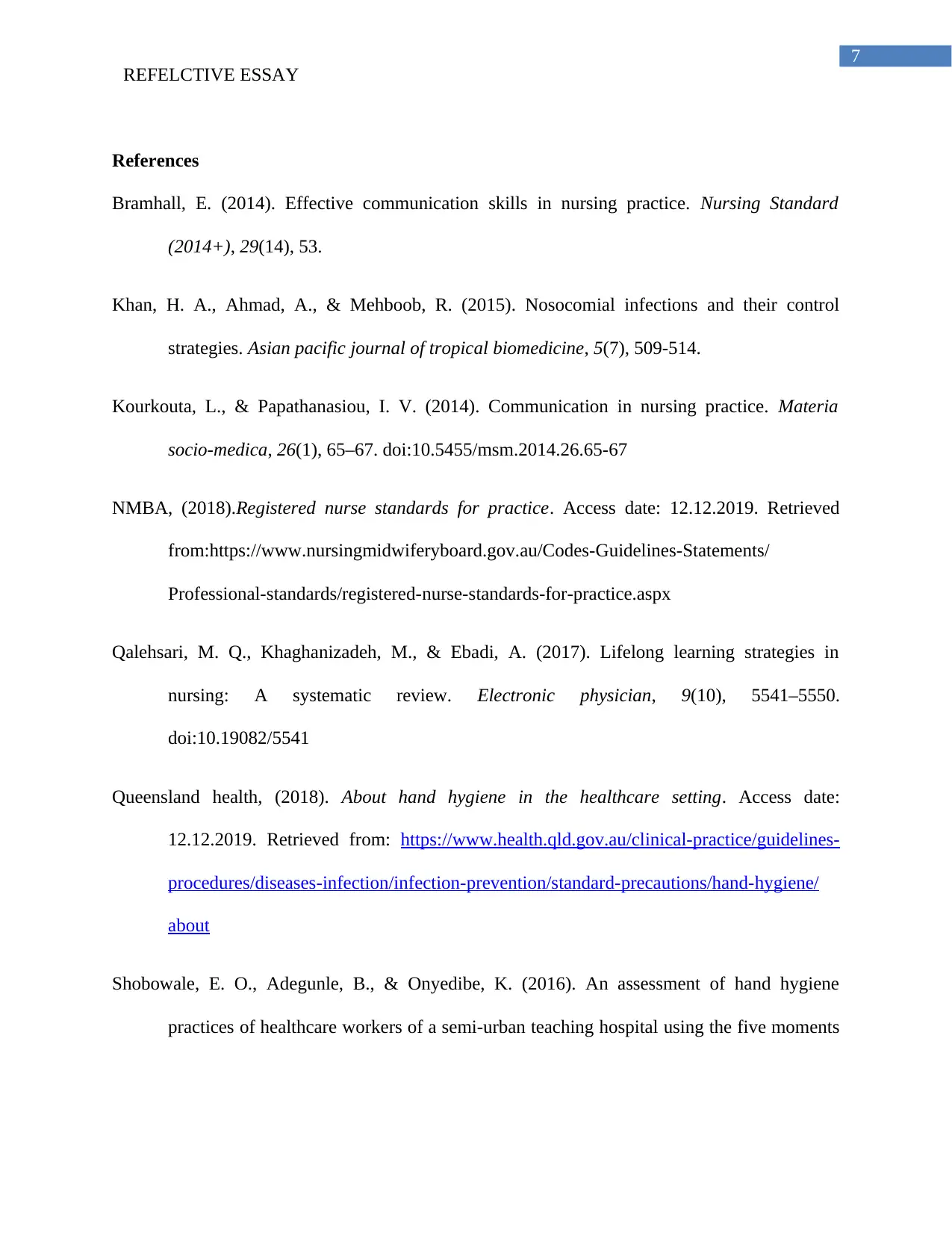
7
REFELCTIVE ESSAY
References
Bramhall, E. (2014). Effective communication skills in nursing practice. Nursing Standard
(2014+), 29(14), 53.
Khan, H. A., Ahmad, A., & Mehboob, R. (2015). Nosocomial infections and their control
strategies. Asian pacific journal of tropical biomedicine, 5(7), 509-514.
Kourkouta, L., & Papathanasiou, I. V. (2014). Communication in nursing practice. Materia
socio-medica, 26(1), 65–67. doi:10.5455/msm.2014.26.65-67
NMBA, (2018).Registered nurse standards for practice. Access date: 12.12.2019. Retrieved
from:https://www.nursingmidwiferyboard.gov.au/Codes-Guidelines-Statements/
Professional-standards/registered-nurse-standards-for-practice.aspx
Qalehsari, M. Q., Khaghanizadeh, M., & Ebadi, A. (2017). Lifelong learning strategies in
nursing: A systematic review. Electronic physician, 9(10), 5541–5550.
doi:10.19082/5541
Queensland health, (2018). About hand hygiene in the healthcare setting. Access date:
12.12.2019. Retrieved from: https://www.health.qld.gov.au/clinical-practice/guidelines-
procedures/diseases-infection/infection-prevention/standard-precautions/hand-hygiene/
about
Shobowale, E. O., Adegunle, B., & Onyedibe, K. (2016). An assessment of hand hygiene
practices of healthcare workers of a semi-urban teaching hospital using the five moments
REFELCTIVE ESSAY
References
Bramhall, E. (2014). Effective communication skills in nursing practice. Nursing Standard
(2014+), 29(14), 53.
Khan, H. A., Ahmad, A., & Mehboob, R. (2015). Nosocomial infections and their control
strategies. Asian pacific journal of tropical biomedicine, 5(7), 509-514.
Kourkouta, L., & Papathanasiou, I. V. (2014). Communication in nursing practice. Materia
socio-medica, 26(1), 65–67. doi:10.5455/msm.2014.26.65-67
NMBA, (2018).Registered nurse standards for practice. Access date: 12.12.2019. Retrieved
from:https://www.nursingmidwiferyboard.gov.au/Codes-Guidelines-Statements/
Professional-standards/registered-nurse-standards-for-practice.aspx
Qalehsari, M. Q., Khaghanizadeh, M., & Ebadi, A. (2017). Lifelong learning strategies in
nursing: A systematic review. Electronic physician, 9(10), 5541–5550.
doi:10.19082/5541
Queensland health, (2018). About hand hygiene in the healthcare setting. Access date:
12.12.2019. Retrieved from: https://www.health.qld.gov.au/clinical-practice/guidelines-
procedures/diseases-infection/infection-prevention/standard-precautions/hand-hygiene/
about
Shobowale, E. O., Adegunle, B., & Onyedibe, K. (2016). An assessment of hand hygiene
practices of healthcare workers of a semi-urban teaching hospital using the five moments
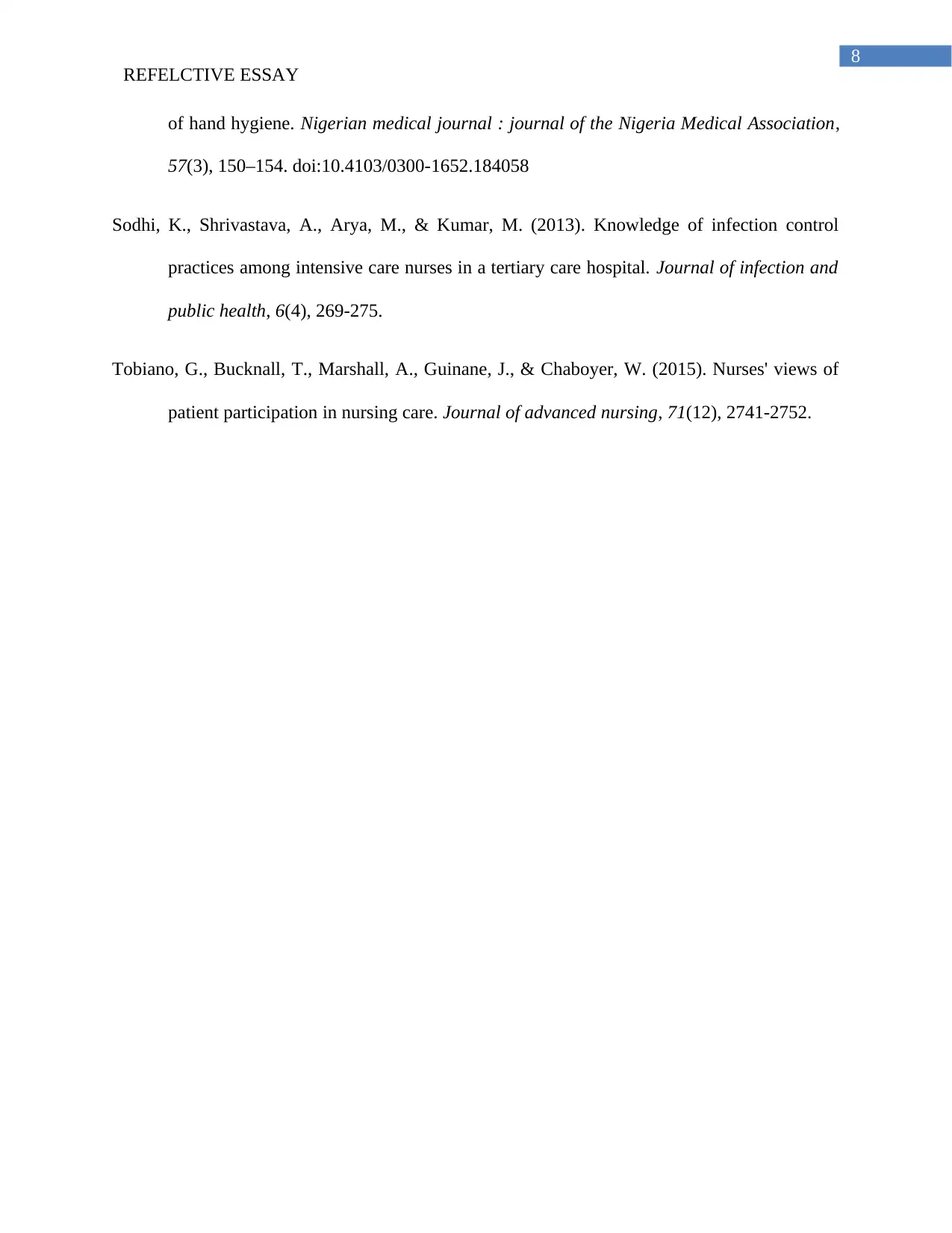
8
REFELCTIVE ESSAY
of hand hygiene. Nigerian medical journal : journal of the Nigeria Medical Association,
57(3), 150–154. doi:10.4103/0300-1652.184058
Sodhi, K., Shrivastava, A., Arya, M., & Kumar, M. (2013). Knowledge of infection control
practices among intensive care nurses in a tertiary care hospital. Journal of infection and
public health, 6(4), 269-275.
Tobiano, G., Bucknall, T., Marshall, A., Guinane, J., & Chaboyer, W. (2015). Nurses' views of
patient participation in nursing care. Journal of advanced nursing, 71(12), 2741-2752.
REFELCTIVE ESSAY
of hand hygiene. Nigerian medical journal : journal of the Nigeria Medical Association,
57(3), 150–154. doi:10.4103/0300-1652.184058
Sodhi, K., Shrivastava, A., Arya, M., & Kumar, M. (2013). Knowledge of infection control
practices among intensive care nurses in a tertiary care hospital. Journal of infection and
public health, 6(4), 269-275.
Tobiano, G., Bucknall, T., Marshall, A., Guinane, J., & Chaboyer, W. (2015). Nurses' views of
patient participation in nursing care. Journal of advanced nursing, 71(12), 2741-2752.
⊘ This is a preview!⊘
Do you want full access?
Subscribe today to unlock all pages.

Trusted by 1+ million students worldwide
1 out of 9
Related Documents
Your All-in-One AI-Powered Toolkit for Academic Success.
+13062052269
info@desklib.com
Available 24*7 on WhatsApp / Email
![[object Object]](/_next/static/media/star-bottom.7253800d.svg)
Unlock your academic potential
Copyright © 2020–2026 A2Z Services. All Rights Reserved. Developed and managed by ZUCOL.





